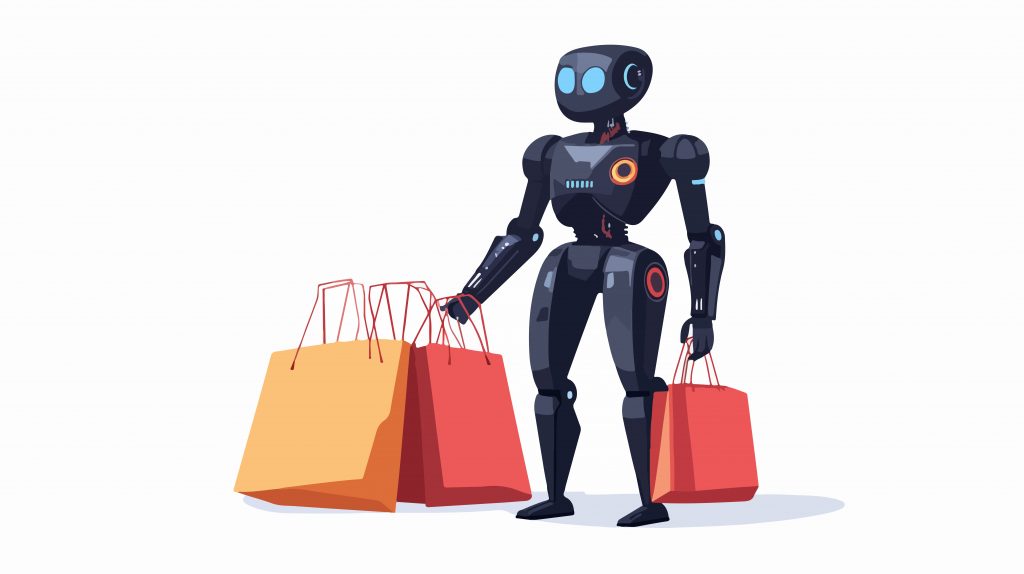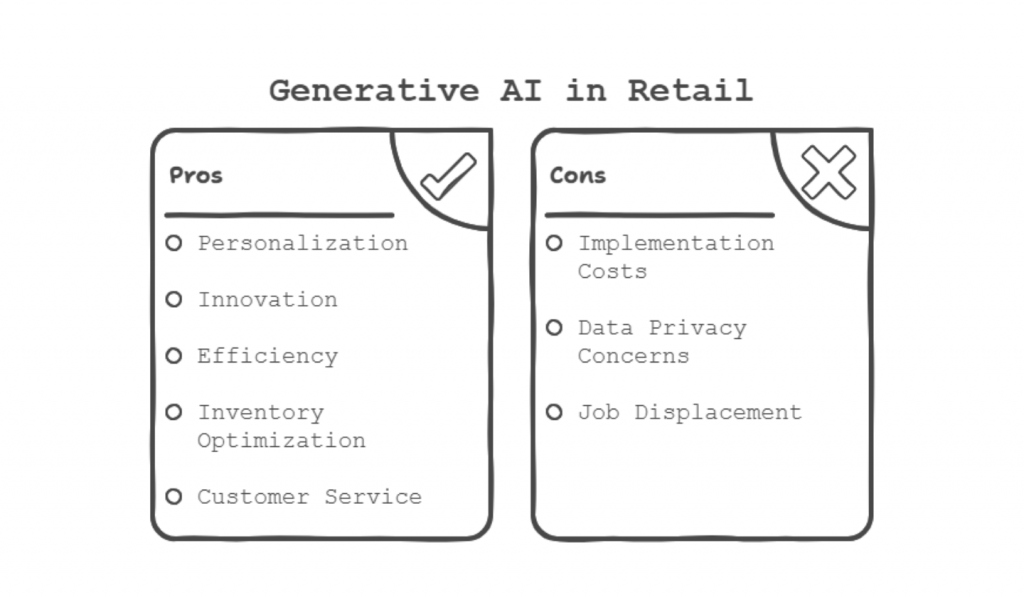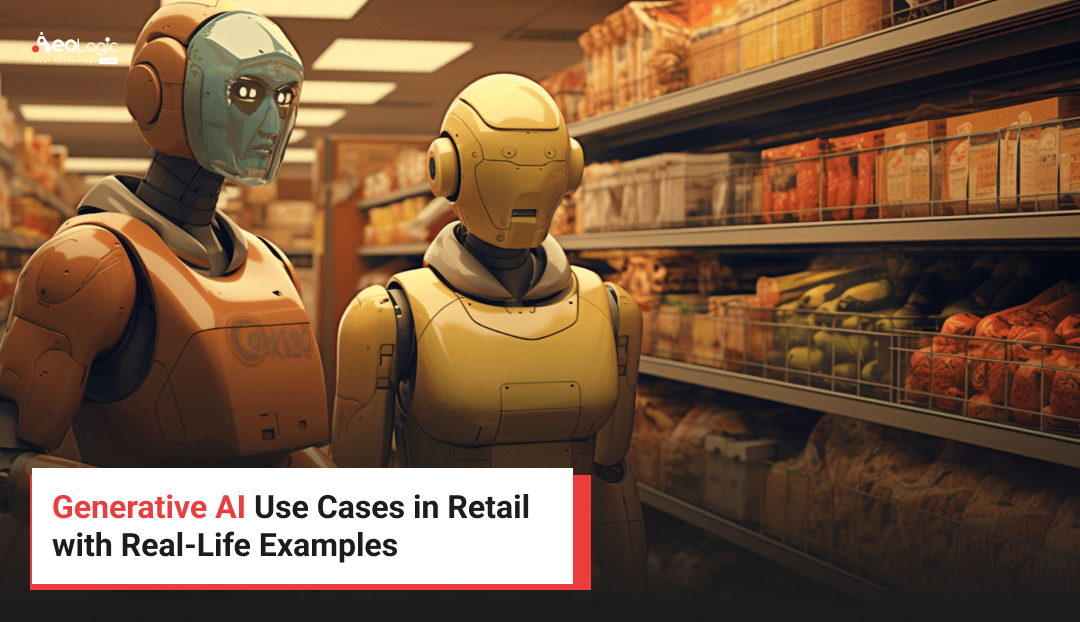The retail industry is a growing industry that is also facing various issues with conventional systems and solutions. The retail industry faces problems like customer dissatisfaction, bad workflow automation, product quality, and bottlenecks. Additionally, retailers face issues with inefficient inventory management, suboptimal pricing and promotions, and a lack of creative, innovative content generation. The generative AI solutions in retail industry has changed everything with its revolutionary potential. It offers various benefits and applications that are not available with any other technology or solution.
Generative AI in industries revolutionizes several key aspects of the sector, including operational efficiency and consumer experience, by automating operations, personalizing interactions, and streamlining processes. In order to boost sales and enhance customer happiness, it assists merchants in comprehending consumer preferences, forecasting trends, and optimizing inventory.
In the retail industry, generative AI has several applications and advantages, such as increasing operational effectiveness, enhancing consumer satisfaction, and stimulating creativity. AI-powered chatbots improve customer service, automate content production, and enable tailored marketing.
Looking for? Top Generative AI Solutions Provider in India
Generative AI in Retail: A $4.2 Billion Opportunity by 2029
The generative AI in the retail market has grown exponentially in recent years. It will grow from $0.79 billion in 2024 to $1.11 billion in 2025 at a compound annual growth rate (CAGR) of 39.8%. It will grow to $4.2 billion in 2029 at a compound annual growth rate (CAGR) of 39.6%.
For the first quarter of 2024, total retail sales were estimated at $1,820.0 billion. E-commerce sales during this period saw an 8.5% increase (±1.1%) from the same quarter in 2023, while total retail sales grew by 2.8% (±0.5%). Therefore, the rise in e-commerce shopping is driving the growth of generative AI in the retail market.
92% of retailers are investing more in AI, and 59% are already using it for personalized product recommendations. 81% of retailers report having a dedicated AI budget, with an average of 50% assigned to generative AI.
Generative AI represents a transformative opportunity in the retail space, providing improved customer service, higher sales, and a more efficient operation. Retailers that adopt this technology sooner rather than later will be in a better position in a rapidly changing market.
Rise and Use Cases of Generative AI in Retail
- 17% of shoppers have used AI for purchasing inspiration.
- 45% of consumers expressed interest in using AI for shopping.
- Retailers are prioritizing customer service use cases, with 36% of employees already using generative AI today, expected to grow to 45% by the end of 2025.
- 93% of retailers are using generative AI for some sort of personalization, including personalized email copy and product recommendations.
- Nearly 60% of surveyed professionals would use generative AI to generate images, text, video, and music content in marketing campaigns.
- 95% of customer interactions are predicted to be handled by AI in 2025.
What is Generative AI in Retail?

Generative AI in retail refers to a type of latest AI that uses advanced algorithms and machine learning models to produce fresh material, such as marketing copy, virtual assistants, and personalized suggestions to improve consumer experiences and expedite processes.
From product creation and inventory management to marketing and customer service, this technology is revolutionizing many facets of retail. By implementing this technology, retailers can stay ahead of the revolutionary curve.
In short, generative AI examines browsing patterns, past purchases, and client preferences. Customized product recommendations are made possible by the insights that are received. This kind of customization increases customer happiness and conversion rates. This overall enhances the retail industry.
Also Read: Role of Generative AI Solutions for Businesses Growth
Generative AI Use Cases In Retail: With Real-Life Examples
There are various generative AI use cases in retail with real-life examples. Here are a few mentioned below.
ShopJedAI Application
ShopJedAI is a game-changing AI solution developed by Master of Code Global to accelerate eCommerce marketing for small and medium-sized businesses. This smart platform, developed in our R&D lab, combines a sophisticated shopping assistant with a cutting-edge ABC ad tool, all powered by a Shopify LLM Assistant based on embeddings and a vector database. It’s not just brilliant, but also practical.
ShopJedAI simplifies daily merchant activities and generates high-converting Shopify ad campaigns on autopilot, resulting in 86% answer accuracy and transforming ordinary retail operations into a simplified, AI-powered experience.
Walmart Vendor Negotiations
AI-powered chatbots are revolutionising vendor negotiations in the retail sector. They improve the procurement process’ efficiency and cost-effectiveness. Walmart, for example, has used a Generative AI-powered chatbot to negotiate cost and purchase terms with its suppliers.
The chatbot negotiates for smaller contracts with equipment vendors. It determines fair prices by taking into account historical trends, competitive pricing, and material costs.
Product and Display Design
The world is moving towards evolution and every day there are a lot of trends coming in the retail industry. But one cannot develop the clothes according to the trends with the traditional systems. The generative AI in retail can analyze various data such as customer preferences, market trends, historical data, demanding trends, etc, and offers a variety of designs of every individual clothes or product.
For example, Stitch Fix, an online personal styling service, uses generative AI to recommend clothing and accessories tailored to each customer’s style and preferences.
North Face’s Interactive Shopping Assistant
The North Face’s website features a conversational shopping assistant powered by IBM’s Watson artificial intelligence. The AI assistant asks consumers a series of questions about their outdoor gear preferences, planned activities, and intended usage before making product recommendations based on their responses.
The North Face improves the online buying experience with generative AI, making it more engaging and personalised to individual needs.
eBay: Personalized Shopping Assistant
Personalization is an aspect that every customer wants to experience. Generative AI in retail can be used to develop AI chatbots and virtual assistants that can navigate customers while they are shopping. Customers just need to provide their queries with the chatbots and virtual assistants and it helps them by providing the best solutions.
eBay is one of the most prominent examples of applying generative AI in retail. eBay ShopBot functions as a personal shopping assistant, guiding users through eBay’s vast selection of over a billion listings to find the best offers.
Customers can communicate with the ShopBot by text, speech, or by submitting a photo to indicate what they’re looking for. To improve its awareness of the user’s needs, the bot initiates more discussions, allowing it to make personalised recommendations.
For example, eBay shows one of the biggest examples of using generative AI in retail. eBay ShopBot serves as a personal shopping assistant, assisting customers in navigating through eBay’s extensive array of over a billion listings to discover the most attractive deals.
Gen AI-Powered Virtual Merchandising
To sell a product in the retail shop, it needs to be at the right location and in the right manner. The generative AI in retail analyzes the data about the customer’s traffic, patterns, best spots of shopping, etc enabling the product to be at the right place and in the best condition. This helps to attract more customers to the product and increases sales.
For example, Zara’s AI-driven layout optimizes product placement, ensuring the most sought-after items are in prominent locations to attract customer attention and drive purchases.
Augmented Reality (AR) Shopping Experiences
Generative AI can improve augmented reality shopping experiences by producing realistic and engaging digital representations of products. Customers can use their cellphones or AR glasses to see how things will look in their homes or on them. This application improves the online shopping experience by decreasing the uncertainty associated with purchasing things without seeing them in person.
Thus, generative AI has a wide range of applications in the retail business, ranging from improved customer experience and operational efficiency to increased security and sustainability. Using these innovative tools, stores can remain competitive and respond to changing market situations.
Dynamic Store Layout Adjustments
Dynamic store layout adjustments in real-time are another important use case of generative AI in retail. The generative AI algorithm analyzes the product placements and customer congestion and then informs the store to change the placement accordingly. This helps customers to be busy in the specific area and look out for more products possible. This helps retail businesses to sell more products easily.
For example, Amazon Go is a prime example, where AI systems constantly monitor customer movements and adjust product placement accordingly. The AI tracks which sections are crowded or under-visited and suggest changes to the layout to improve customer flow and shopping efficiency.
Generative AI Powered Marketing Campaigns
Marketing is a strong aspect in retail businesses that can attract customers in large numbers if done properly. But the traditional way cannot help too much. The generative AI in retail can analyze the customer’s preferences, market demands, etc to develop and run the marketing campaign according to that. For example, Levi’s employs AI to create personalized marketing images and product recommendations, appealing to a wide range of body types and customer preferences.
Also Read: The Future of Advanced Generative AI Solutions for Business
What are the Benefits of Generative AI in Retail?

With a lot of use cases, there are a lot of benefits of generative AI in retail. Here are a few key benefits mentioned below.
Increases Personalization
Personalization has been one of the top benefits of AI for a long time. The generative AI-powered chatbots, virtual assistants, recommendations, services, advertisements, etc provide a great experience to the customers. This just not only enhances or increases the personalization in the retail industry but also increases the customers’ regain percentage. The smoother experience customers get, the more they like to revisit.
Innovation and Product Development
Innovation is a necessary aspect that should be enhanced with time. Sometimes, the human mind can run out of ideas which reduces innovation. The generative AI in retail provides interesting, unique, and innovative ideas for product development. The innovation could be based on market trends or can be so good that it creates the trend in itself. So generative AI could be the innovator for your retail business.
Efficiency and Cost Reduction
In the retail industry, generative AI can automate a number of functions, including inventory management, customer support, and content production. Businesses can concentrate more on strategic decision-making and other crucial duties as a result of time and labor cost savings. This overall enhances efficiency and also cuts down the unnecessary expenses for the retail businesses.
Explore more: Generative AI Consulting Services to Drive Business Growth
Optimizing Inventory Management
Inventory management plays an important role in the success of retail businesses. But sometimes, it cannot be managed perfectly in the traditional ways. The generative AI in retail can track the inventory in real-time with the integration of IoT. Also can analyze the data about the stock when and which products need to be refilled. The better inventory management, the more a retail business becomes successful.
Improved Customer Service
Generative AI improves customer service by delivering correct and quick responses. It is an appealing choice for traders. In fact, 58% of retail organisations are exploring using AI to create customer support chatbots. This technology simplifies interactions and enhances the entire customer experience.
Furthermore, 38% of merchants use advanced search technology to better comprehend their clients’ enquiries. It emphasises the increased interest in leveraging new technology to improve customer service.
Pricing to Generative AI Solutions In Retail
Generative AI pricing in retail varies significantly depending on the specific application, complexity, and size of the retailer. It can range from a few thousand dollars for basic SaaS solutions to hundreds of thousands for enterprise-level implementations and custom integrations. Here is the cost breakdown mentioned below.
- AI-powered supply chain optimization may cost between $50,000 and $200,000 per year, with custom integrations adding $20,000 to $100,000.
- AI for marketing can range from $500 to $5,000 per month for SaaS solutions, with enterprise-level implementations costing upwards of $50,000 per year.
- Developing a custom AI solution can range from $20,000 to over $500,000, depending on the complexity of the project and specific requirements.
- E-commerce enhancements may cost $5,000 to $50,000 for small-scale implementations, potentially reaching $500,000 for large-scale projects.
- Licensing for platforms like Tableau or Google Analytics 4 can cost $1,000 to $15,000 per year, with custom dashboards costing $10,000 to $100,000.
According to a McKinsey study, Generative AI is expected to deliver a value of $400 billion to $660 billion annually in the retail and consumer goods industry alone, which seems to be a good return on investment.
| Application Area | Cost Range | Notes |
|---|---|---|
| AI-Powered Supply Chain Optimization | $50,000 – $200,000 per year | Custom integrations add $20,000 – $100,000 |
| AI for Marketing (SaaS Solutions) | $500 – $5,000 per month | Enterprise-level: $50,000+ per year |
| Custom AI Solution Development | $20,000 – $500,000+ | Depends on complexity and specific needs |
| E-commerce Enhancements | $5,000 – $50,000 (small scale) | Large-scale projects up to $500,000 |
| Licensing for Analytics Platforms | $1,000 – $15,000 per year | Custom dashboards: $10,000 – $100,000 |
Also Read: How Businesses Can Leverage Generative AI Solutions for Growth
Final Take
The retail industry needs a revolutionary solution, and generative AI has proved its worth. The generative AI in retail enhanced those aspects that seemed not possible a few years ago. Retail businesses are getting more personalization, data-driven decision-making, better efficiency, cost reduction, customer regain rate increment, etc with the deployment of generative AI. Overall, every retail business should think about generative AI and plan to adopt it to make their business grow at a rapid pace.
We are well-equipped to develop Generative AI solutions tailored to your specific business demands. We can also help integrate AI into your existing communication platforms, productivity tools, or other apps.
Contact us today for Generative AI consulting to help you elevate and change your retail business with artificial intelligence.
FAQs
How is generative AI being utilized to personalize shopping journeys in the retail space?
Generative AI is taking customer data and utilizing that data to generate product recommendations, marketing messages, and promotions. This means retailers are able to personalize elements of the customer journey, and allow businesses to connect with customers, and increase sales by providing visibility of items that fall in line with individual preferences.
Is generative AI going to aid inventory management in retail?
Yes, generative AI can predict demand patterns, using historical sales and market data. With that, retailers can effectively manage stock levels, minimize overstock, or stockouts, and inventory management and supply chain can work more efficiently.
How does generative AI improve customer service in retail?
Generative AI powers chatbots and virtual assistants to understand and respond to customers in a timely and natural way. Chatbots and virtual assistants are open 24/7 and can guide customers in product searches, or issues resolution, ultimately fostering greater satisfaction.
What function does generative AI perform in retail marketing and content creation?
Generative AI is capable of automating the production of product descriptions, and social media and advertising posts. Generative AI facilitates quicker marketing development workflows, while also allowing for semi-auto-generation of consistent, engaging messages in a wide variety of formats and distribution channels.
Is generative AI helpful in virtual try-on and augmented reality experiences?
Absolutely! Generative AI is capable of generating real pictures and simulations to activate virtual try-on functionality for clothing, accessories, and makeup. Virtual try-on applications remove the guesswork in visualizing how apparel or makeup products will look, thereby reducing product returns and giving customers more confidence to purchase online.

I’m Deepika Pandey, an SEO strategist and content writer with 6+ years of experience. I create SEO-friendly content that drives traffic and engages readers. I combine data insights with creativity to help businesses grow their online presence effectively.







